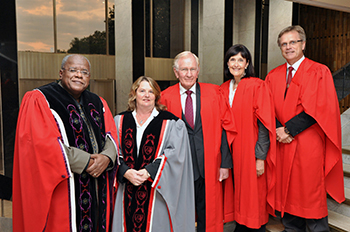Latest News Archive
Please select Category, Year, and then Month to display items
13 August 2024
|
Story Anthony Mthembu
|
Photo Sibahle Dayimani and Amandla Kulu
 Prof Peter Roseel, Managing Director of Management Consulting and Research – a spin-off of the Catholic University of Leuven in Belgium; and Prof Nicolene Barkhuizen, Director of the UFS Business School.
Prof Peter Roseel, Managing Director of Management Consulting and Research – a spin-off of the Catholic University of Leuven in Belgium; and Prof Nicolene Barkhuizen, Director of the UFS Business School.
The Business School at the University of the Free State (UFS) hosted Prof Peter Rosseel, Managing Director of Management Consulting and Research – a spin-off of the Catholic University of Leuven in Belgium – for a guest lecture during his visit to the UFS Faculty of Economic and Management Sciences (EMS).
The guest lecture took place on 19 July 2024 in the Business School Auditorium and was attended by academics from the UFS.
Reflecting on the lecture
The lecture presented by Prof Rosseel focused on how combining strategy, strategy implementation, culture transformation, leadership, and learning successfully leads to sustainable growth, creates engagement, and delivers tangible results. Throughout the lecture, Prof Rosseel spoke about how experts tend to make bad leaders and therefore stop change from happening within an organisation. In fact, he highlighted that, “Experts stop change from happening within the workplace because experts, by definition, look through the eyes of their expertise, but you cannot reduce the world to different forms of expertise, as it is holistic.” As such, he argued that to change an organisation, one must see things from the point of view of others.
Furthermore, Prof Rosseel delved deeper into the hierarchical operating model within organisations. He indicated that the above model should be one community within organisations; however, unfortunately it is not. This is because organisations are made up of several departments such as finance and human resources. As such, he regards these departments to be silos that could prove to be detrimental to organisations, as each silo can create its own culture as opposed to an organisational culture. These are some of the points he discussed throughout the lecture.
After the lecture concluded, the audience had the opportunity to engage with Prof Rosseel on his viewpoints. In fact, Lyle Markham, Academic Head of Department and Lecturer in Industrial Psychology at the UFS, was one of the audience members and described the lecture as insightful.
Wrongful suffering must be compensated, Prof Johann Neethling argues
2016-04-20

From the left are Prof Jonathan Jansen, Vice-Chancellor and Rector, Prof Caroline Nicholson, Dean of the Faculty of Law, Prof Neethling, Prof Rita-Marie Jansen, Vice-Dean, and Dr Brand Claassen, Head of the Department of Private Law.
Photos: Stephen Collett
|
On 11 April, the Faculty of Law held the first of the year’s series of Prestige Lectures presented by Prof Johann Neethling, Senior Professor in the Department of Private Law. The event was attended by senior faculty members, the Dean of Law Prof, Caroline Nicholson, and the Vice-Chancellor and Rector, Prof Jonathan Jansen.
In his opening remarks, Prof Jansen said “Prestige lectures are at the heart of a university’s academic endeavour. It would serve the university community well to present them more often, as they go to the heart of important issues that affect society”
Prof Neethling made a compelling case for compensation for wrongful suffering by a child born with impairments. Since the mid-1960s, the actions of wrongful conception and wrongful birth have been recognised in South African law. Wrongful conception is defined as when a healthy child is born as a result of failed sterilisation or abortion, and wrongful birth is when a doctor fails to inform parents of a disability before the birth of their child.
“The reality is that a child born with impairments may indeed suffer (sometimes extreme) pain, loss of amenities of life, which would justify an award of damages,” he said.
So far, the action for wrongful suffering has been dismissed by the High Court and the Supreme Court of Appeal. However, he highlighted several cases where wrongful conception and wrongful birth was recognised by the courts.
“Why can the same approach (for wrongful conception and wrongful birth) not be followed in wrongful suffering claims by accepting that a disabled child seeks to address the consequences of its birth?” he asked.
Prof Neethling is regarded as one of the greatest minds in Private Law, not only in South Africa but in the African continent.
A festschrift, Essays in Honour of Johann Neethling (2015), with contributions from more than 50 of his peers around the world, was also launched at the lecture.